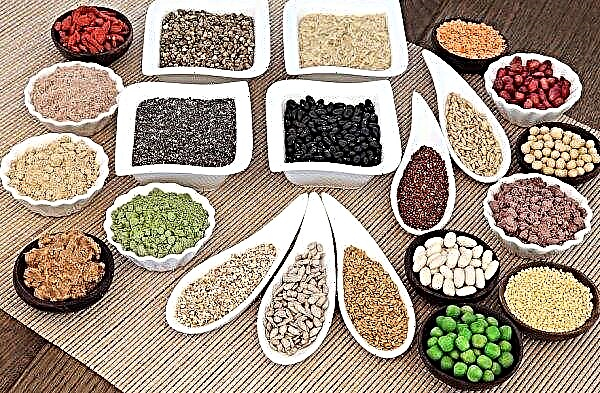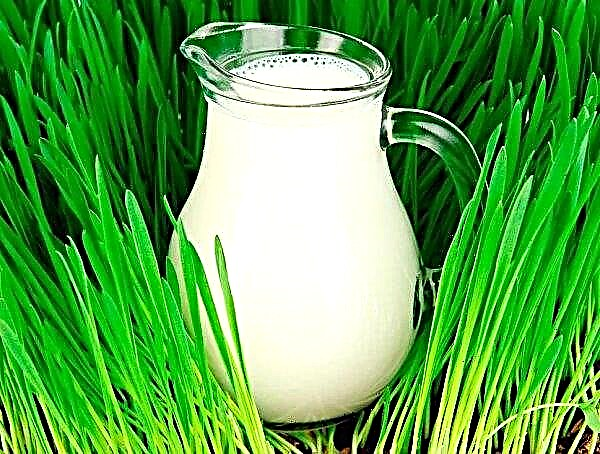Gout can occur in any person and is accompanied by painful inflammation in the joints, as well as redness and swelling of the skin on the affected area. To quickly cope with the disease, you need to carefully monitor your diet and include only healthy foods, one of which is melon. This article describes the chemical composition of the fruit and its effect on the human body with gout, the rules and regulations for the use of the product, as well as ways to store it.
Chemical composition and calorie content
Melon pulp is considered a low-calorie product, but it contains many vitamins and elements useful to the human body. Therefore, it is allowed to use during the diet and with many diseases.
Did you know? China Melon Leader — annually about 8 million tons of ripe fruits are harvested here.
The nutritional value of 100 g of the product is:
- calorie content - 35 kcal;
- proteins - 0.6 g;
- fats - 0.3 g;
- carbohydrates - 9.0 g;
- organic acids - 0.2 g;
- dietary fiber - 0.9 g;
- water - 90 g;
- ash - 0.6 g.

- vitamins - A, B1, B2, B4, B5, B6, B9, C, E, K, PP;
- macroelements - potassium, calcium, silicon, magnesium, sodium, sulfur, phosphorus, chlorine;
- trace elements - aluminum, boron, vanadium, iron, iodine, cobalt, lithium, manganese, copper, molybdenum, nickel, rubidium, selenium, strontium, fluorine, chromium, zinc, zirconium;
- digestible carbohydrates - starch, glucose, sucrose, fructose;
- saturated fatty acids;
- Omega-3 and Omega-6 fatty acids.
Is it possible to eat melon with gout?
If metabolic process is disturbed, uric acid begins to accumulate in the tissues of the body, which leads to the appearance of painful symptoms of gout. To get rid of this disease, a person needs to adhere to the diet recommended by the doctor and completely eliminate harmful products from the daily menu that cause the formation of salts. Watermelons and melons contain a lot of fiber, water and vitamins, so they are recommended for use with gout.
Watermelons and melons contain a lot of fiber, water and vitamins, so they are recommended for use with gout.
But at the same time, you need to know about possible contraindications and observe the measure. Read more about the useful and harmful properties of fruits - further in the article.
Benefit
Due to its rich chemical composition, the flesh of the melon brings great benefits to the human body and helps to fight many diseases, and also prevents the appearance of complications.
- The main healing properties of this fetus are listed below:
- strengthens the immune system and tones the body;
- improves digestion and prevents constipation;
- It is an effective prophylactic against worms;
- improves the condition of hair and skin, contributing to the disappearance of blackheads;
- increases hemoglobin and eliminates anemia;
- beneficial effect on the state of the cardiovascular system;
- relieves inflammation of the mucous membrane of the upper respiratory tract with colds;
- Helps fight depression and improves mood
- promotes weight loss and cleanses the digestive tract;
- eliminates insomnia and has a calming effect on the nervous system;
- beneficial effect on a woman’s body during pregnancy, because it contains folic acid;
- helps in the treatment of kidney and liver diseases;
- strengthens bones and muscles.
Important! You can choose a quality melon according to external characteristics — the ripe fruit exudes a delicate aroma, has a dried stalk, and its skin is slightly springy when pressed.
Harm and contraindications
Ripe melon has a lot of healing properties, but in some cases its use may be undesirable and even dangerous for the body. Therefore, before using the fruit for the treatment of gout, it is recommended to consult with your doctor.
- Melon pulp should not be eaten in the presence of such body conditions:
- urolithiasis - the product has a powerful diuretic effect on the body and can trigger an exacerbation of this disease;
- lactation in women - the substances contained in the fetus pass into breast milk and may cause indigestion in the infant;
- an ulcer of the intestine or stomach, gastritis - the juice of this berry irritates the mucous membrane of these digestive organs and can cause an exacerbation of the disease;
- diabetes mellitus - the sweet pulp of the fetus significantly increases blood sugar;
- individual intolerance to the product - in this case, after eating pulp, an allergic reaction may occur in the form of a rash or digestive disorders.

Melon Healing Effectiveness
To cure gout, it is necessary to lower the concentration of uric acid in urine and blood. Derivatives of this substance are acidic urate salts, which are also deposited in the joints and cause pain. Therefore, to treat the disease, the doctor prescribes a course of medications that promote the excretion of uric acid and urate salts with urine. The pulp of melons and gourds has similar properties and can be used as an adjuvant for gout.
- The use of ripe melon in food during this disease has a positive effect on the human body:
- stops the inflammatory process in the joints;
- well removes fluid from the body, which reduces edema;
- contributes to the normalization of metabolism;
- has a diuretic effect, contributing to the rapid excretion of uric acid and salts from the body;
- prevents the development of complications of the disease.
Did you know? The largest melon was grown in 2009 in Austria — the weight of the fetus was about 200 kg.
Rules and regulations for consumption
The attending physician will help calculate the allowable daily dose of melon with gout, t. This indicator depends on the person’s age and general condition of the body. On average, an adult is allowed to eat 200-300 g of juicy fruit pulp per day.
On average, an adult is allowed to eat 200-300 g of juicy fruit pulp per day.
The main recommendations for eating melon for gout are listed below:
- for the best therapeutic effect, the fetus is recommended to be consumed fresh;
- melon should be eaten between meals as an independent dish - in combination with other products, it can cause fermentation processes in the stomach;
- it is recommended to cut the berry into pieces immediately before use, i.e., when exposed to air in the pulp, harmful bacteria multiply rapidly;
- fruits can be used to make fruit toppings for baking, as well as in baked, dried and dried form;
- Do not eat melon with alcohol, cold water and milk - this can cause a serious digestive upset.
 This product is often used during fasting days. In this case, up to 2 kg of pulp is allowed to be consumed during the day, dividing this amount into 6–8 meals. Arrange such fasting days can be no more than 1 time in 2 weeks.
This product is often used during fasting days. In this case, up to 2 kg of pulp is allowed to be consumed during the day, dividing this amount into 6–8 meals. Arrange such fasting days can be no more than 1 time in 2 weeks.Product Storage Methods
The melon is stored in uncut form for the longest time, but different varieties have different keeping times, which can range from 2 weeks to several months. For long-term storage, slightly ripened fruits are suitable, which do not have mechanical damage to the peel and signs of rot.
Important! At an air temperature close to 0°With the pulp of ripe melon, a toxic substance is formed, ethylene, which can provoke poisoning of the body.
The basic rules for storing melons are listed below:
- whole fruits can be stored for up to several months (depending on variety) in a dark room with a temperature of +6 ... + 8 ° С and humidity of about 80%;
- melon absorbs foreign odors well, so it is better to keep it separate from other vegetables and fruits;
- berries should be placed in storage on a soft litter of sawdust or sand so that the fruits do not touch each other;
- you can put the fruits in a box with sawdust or sand - while they are placed vertically, and their stalks should be below;
- well-stored melons, individually suspended in a grid from the ceiling of the basement - while in the room you need to ensure good air circulation;
- in the refrigerator, whole fruits can be stored for up to 2 weeks - it is recommended to put them on the lowest shelf, wrapping with a cloth or a layer of cling film with openings for air access;
- at room temperature, whole berries can remain fresh for 1 week if kept in a shaded place;
- it is recommended to eat the cut fruit immediately, but if necessary, it can be stored in the refrigerator for two days;
- you can freeze the melon by cutting its peeled pulp into thin strips - they are laid out at a certain distance from each other and put in the freezer, and after freezing they are put in bags. You can store such a product in the freezer for 1 year.
 Sweet and juicy melon not only pleases us with its excellent taste, but also acts as an effective adjuvant for the treatment of gout. Using the recommendations on the use of fruits listed in this article, you can enrich your body with vitamins and quickly cope with the disease.
Sweet and juicy melon not only pleases us with its excellent taste, but also acts as an effective adjuvant for the treatment of gout. Using the recommendations on the use of fruits listed in this article, you can enrich your body with vitamins and quickly cope with the disease.












